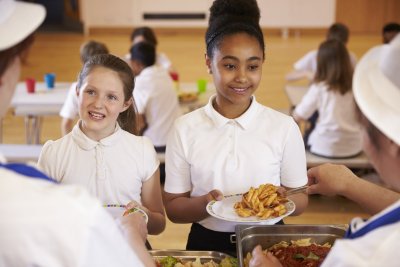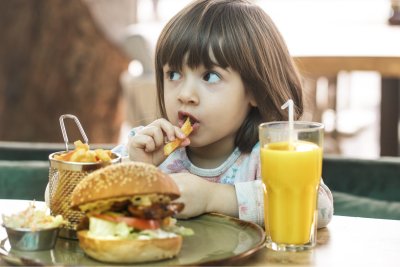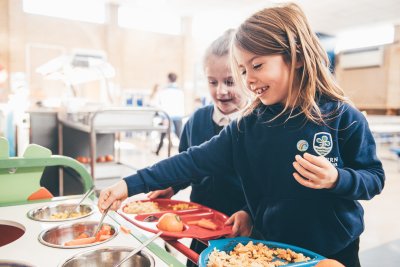News • Children's Food Campaign
MPs debate Free School Meals in Parliament
In a spirited Westminster Hall debate, MPs from across multiple political parties underscored the vital importance of nutritious school lunches, the need for automatic enrolment and increased funding for school food programmes. Here are the Children's Food Campaign highlights of the debate.

MPs gathered in Westminster Hall on 7 May to debate on free school meal provision. It's clear that expansion of healthy school meal is essential to an investment in children's health and their future. Watch the whole event here.
Reflecting on the debate, Children's Food Campaign Manager Barbara Crowther said:
"We welcome this cross-party debate on free school meals, and applaud the passion of MPs from across the political spectrum in advocating for children's right to healthy food. It is disappointing yet again to see no clear pledge from either the Government minister nor the Labour shadow front bench to put the scandalous £7400 eligibility threshold under proper review, and give working families the support they need. We are one of the richest countries in the world, but we are still penny pinching when it comes to children's health and making our schools a beacon of healthy nutrition, free of stigma and means testing."
Liberal Democrat Munira Wilson MP for Twickenham, who secured the debate, opened by talking about the numerous benefits of healthy school food, especially for families on low incomes:
"A free school meal can be life-changing. It provides a 'triple whammy of benefits': saving parents time and money, improving educational outcomes and encouraging children to eat healthier."
"Free school meals are a simple way of ensuring that all children from low-income families have at least one well-balanced and healthy meal a day. Doing nothing is simply unsustainable, economically, morally and politically."
Chair of the All Party Parliamentary Group on School Food Sharon Hodgson MP from Washington South highlighted that achieving #schoolfoodforall is a journey. Ensuring meals for all children in poverty, implementing auto-enrolment should be considered as key stepping stones towards a longer term universal vision. In Children's Food Campaign's recent research 77% of parents back a phased expansion of healthy meals for all.
“The next step on this road is to implement automatic enrolment as soon as possible. Local authorities like Sheffield are leading the way on this already, and prove it works. Every eligible child should be eligible from day one."
In his response to the debate, Conservative Minister of State for School Standards, Damien Hinds acknowleged the potential of an auto-enrolment option for free school meals, and promised to keep looking into this route. He said:
"We do want to make it as simple as possible for schools and local authorities to determine eligibility and for families to apply. That is why we have the eligibility checking service. I am also aware of some of the innovative things local authorities are doing to look at auto-enrolment. We think there is merit in those projects, which we will look at closely.... it is definitely something that we want to study further and learn from."
Ian Byrne MP from Liverpool West Derby called for a Right to Food, by highlighting the absurdity of breaking the principle of universal care for children in school when it comes to food.
"If we accept the universal and compulsory requirement that all children up to the age of 16 must be in school, why do we break the principle of universal care, nurturing and protection in relation to meals during the school day? We would think it absurd for children not to be provided with adequate shelter, heating, drinking water or sanitary provision while in school, so why do we take a different approach to the equally essential element of food?"
Ian Lavery, the MP for Wansbeck spoke passionately about his own childhood experiences of free school meals and the levels of child poverty in his constituency. He urged all MPs to act.
"Child hunger is a political choice. A political choice that my colleagues make by failing to act. That must change."
Members from devolved nations in Wales and Scotland, where primary school meals are being expanded to all pupils, also called for a UK wide political consensus for action. Beth Winter, MP for Cynon Valley in Wales, drew attention to the divisions inherent in a means-tested system that lead to stigma, and the fact that up to 250,000 eligible children are still not taking up their entitlement. She applauded Wales' progress in providing primary school meals to all pupils, saying:
"It is time for England to catch up.... England can start to catch up with Wales by ensuring at least the 900,000 children living in poverty but not having access to free school meals are able to do that."
Carol Monaghan MP, the shadow education spokesperson for the SNP reflected that there is a political choice being made. She spoke the effects on working families of the low threshold of eligibility for Free School Meals of £7400 a year.
"This harsh means testing in England means many children are struggling to learn even though their parents are in work ... When we have means testing for free school there is always stigma asociated with that. So, in Scotland it was very important to us that it was a universal policy when we rolled out free school meals in primaries, currently primary 1-5 but being expanded further in the next two years."
The Labour shadow schools minister Catherine McKinnell MP spoke about regional inequalities in eligibility for free school meals, and Labour's election pledge to introduce universal breakfast clubs in primary schools at a cost of £365 million per year. However she cited the higher costs of expanding school meals to all children, and Labour's desire to take more targetted approaches, but failed to then address the low eligibility threshold itself, as Munira Wilson MP also pointed out.
Responding to the debate for the Government, Schools Minister Damian Hinds said
"The Government is determined to measure that every child regardless of their background can have the best start in life and nutrition and school meals are of course important to that. Not only does it support the development of healthy eating habits that can pave the way to lifelong wellbeing and also supports in the medium term pupils to concentrate to learn and to get the most from their education. And it is for those reasons that the department spends over £1.5 billion annually on policies to deliver free and nutritious food to children and young people."
Expanding healthy school food for more children is the top priority cited in Our Children, Our Future, our parents' manifesto for healthy children's food. Parents in the Children's Food Ambassador programme are calling on the government to expand free school meals to all children from nursery to sixth form/college, regardless of background. You can support their call and add your name to the manifesto here.
Published Tuesday 7 May 2024
Children's Food Campaign: Better food and food teaching for children in schools, and protection of children from junk food marketing are the aims of Sustain's high-profile Children's Food Campaign. We also want clear food labelling that can be understood by everyone, including children.





